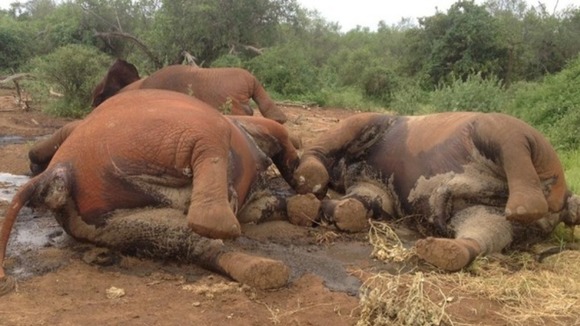“Genocide by Other Means”: Chemist warns that cyanide, mercury “catastrophic environmental risk” in South Kordofan
“Dr [Yasser] Hamouda [a chemical researcher at the University of Chester in Britain] questions the government’s motives for “moving government mining residues from various regions of Sudan to South Kordofan.” (Radio Dabanga)
In fact, the Khartoum regime’s motives for using South Kordofan as a dumping ground for highly toxic chemicals are not in doubt: this is simply a particularly convenient extension of genocidal efforts that take many forms: denial of humanitarian access, relentless aerial bombardment of civilians and civilian targets, burning villages and foodstocks, forcibly displacing hundreds of thousands of the Nuba people of South Kordofan—ER
Chemist: Cyanide, mercury ‘catastrophic environmental risk’ in South Kordofan
Radio Dabanga, December 7 – 2016 | SOUTH KORDOFAN
An expert has warned of “catastrophic environmental risks” of the use of cyanide in mining, and the serious effects on the population and the environment from processing factories in South Kordofan. In an interview with Radio Dabanga on Wednesday, Dr Yasser Hamouda, a chemical researcher at the University of Chester in Britain, expressed alarm that the Sudanese government allows the use of the highly toxic cyanide in mining. He highlighted the dangerous effects of cyanide on living organisms and the environment.
How deadly is cynanide? Here are some of the scores of elephants killed by poachers using cyanide poisoning in Zimbabwe. African elephants can weigh up to 7,000 kg (15,400 lbs)—thousands of times the weight of a young human child.
Dr Hamouda said that most countries in the world countries have prohibited its use because it is difficult to control. He pointed out that it takes less that two grams of cyanide to kill humans and animals. In the interview, Dr Hamouda referred to the serious impact of the use of cyanide through experiments in countries such as Romania, New Guinea, the Philippines, and Argentina.
He also warned of the risks of traditional mining to human health as a result of the use of mercury: “The Sudanese government’s allowing of this kind of mining without providing safety as irresponsible.”
Dr Hamouda questions the government’s motives for “moving government mining residues from various regions of Sudan to South Kordofan. “The Government has begun establishing a Karta factory in Kadugli in South Kordofan where there are heavy rains.”
He warns of dangers of cyanide penetrating ground water, contaminating wells and valleys that are a source of drinking water for humans and animals. He has pointed to the broad popular rejection of establishing Karta factories in the Abu Gubeiha and Alleray areas.
Kordofan
The national committee for environmental advocacy and victims of mining in South Kordofan state have called upon the central government authorities to stop the mining companies from using cyanide. On Tuesday, the committee’s spokesman Ahmad Mukhtar, told Radio Dabanga that various committees of the localities in the state called for a meeting on Sunday in Khartoum where they talked about the seriousness of these companies that operate without people’s consent, and without control or respect for the environment.
He says that there are more than 11 companies mining gold using cyanide in various areas of the state. He said that these companies do not enjoy consent from the local people, but are granted licenses with the approval of the state government headed by Governor Eisa Abakar.
Divide and rule
Mukhtar accuses the state government of pursuing divide and rule policies by tempting some native administrations to pass its agenda and decisions which are rejected by the people of the state.
